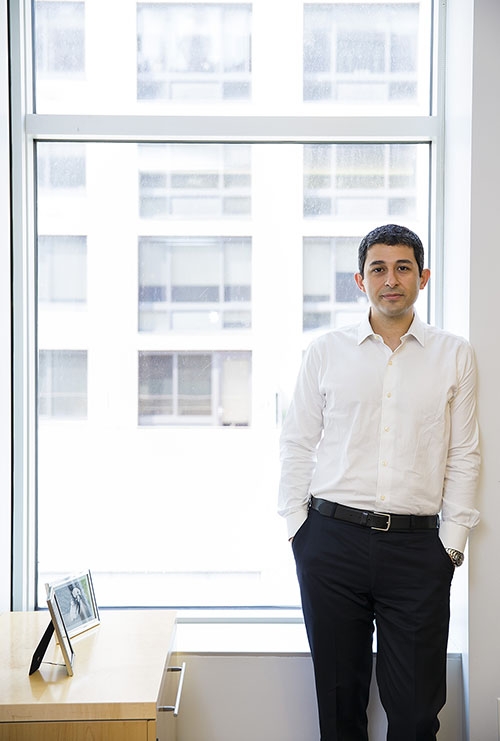
Dr. Hooman Kamel. Photo Credit: Nousha Salimi
An irregular heartbeat that patients develop after surgery appears to predict later instances of stroke, according to a new study by Weill Cornell Medical College researchers.
The study, published Aug. 13 in JAMA, found that patients who received a new diagnosis of atrial fibrillation (AF) while hospitalized for surgery were more likely to suffer a stroke during the next several years than patients who did not have AF. The risk for stroke was greatest in patients whose surgery did not involve their heart, compared to those who had heart surgery, suggesting that AF triggered by the body’s reaction to the physical and emotional stress of surgery is a sign of higher stroke risk in the future. The University of Iowa Carver College of Medicine, the University of Pisa, and the Population Health Research Institute collaborated on the study.
AF is an abnormal heart rhythm that can cause blood clots to form in the heart. The clots may leave the heart and travel to the brain, causing a stroke. People with AF are five times more likely to have a stroke. AF affects more than 2 million Americans, including up to 40 percent of patients who have open-heart surgery and 1 percent of patients who undergo other surgeries.
"Many physicians view AF resulting from surgery as a temporary condition, and current guidelines don’t make specific recommendations for carefully monitoring these patients over time. Our study suggests that AF after surgery requires careful long-term follow-up," says one of the lead authors, Dr. Gino Gialdini, a post-doctoral research fellow in the Feil Family Brain and Mind Research Institute at Weill Cornell. "We tracked patients whose surgery led to AF and found it significantly increased their long-term risk of stroke."
The researchers analyzed data about 1.7 million patients who were hospitalized for surgery throughout California and found that 1.4 percent of patients were newly diagnosed with AF after their surgery. (Patients with a previous AF or stroke diagnosis were excluded from the study.)
Researchers also compared the relationship between AF and stroke after heart surgery with other types of surgery. They found that 1 percent of patients newly diagnosed with AF after heart surgery had a stroke one year after their discharge, compared with 0.8 percent of patients who did not have AF. The stroke rate was higher from surgeries that did not involve the heart: In that group, 1.5 percent of patients with AF had a stroke at one year, compared with 0.4 percent without AF.
In addition, 22.2 percent of patients who had an episode of AF after heart surgery experienced AF symptoms again at one year, compared with 4.7 percent of patients who didn’t have AF. After other types of surgery, the recurrence rates were 37.3 percent in those with AF and 1.5 percent in those without it.
Approximately 47 million general surgeries are performed in U.S. hospitals each year, which underscores the critical need to improve our understanding of this common arrhythmia in surgical patients, says the study’s other lead author, Dr. Hooman Kamel, assistant professor of neurology and neuroscience in the Feil Family Brain and Mind Research Institute and the Department of Neurology.
"The medical community is making significant strides in managing patients with AF and other risk factors for stroke," he says. "Although the incidence of AF after surgery isn't terribly high, even a brief occurrence may be a sign of future risk. If a patient develops AF while hospitalized for surgery, it should be documented and clearly communicated to the patient and the primary care doctor. This will help ensure careful follow-up and individualized treatment plans designed to reduce the risk of stroke as much as possible."
The research was supported by grant K23NS082367 to Dr. Kamel from the National Institute of Neurological Disorders and Stroke.
